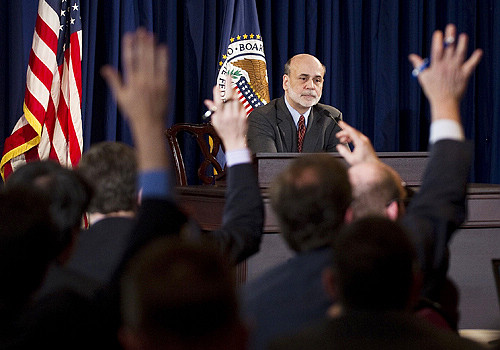|
 |
|
ECONOMIC IMPETUS: Ben Bernanke, Chairman of the U.S. Federal Reserve, speaks at a press conference in Washington, D.C. on April 27. The Fed said it will maintain quantitative easing in a bid to stimulate economic recovery (XINHUA/AFP) |
The risk is large amounts of excess reserves banks are holding at the Fed will enter into the money flow as the economy recovers and profit opportunities increase. The Fed will need to have a credible exit strategy to dampen inflationary expectations. By holding interest rates too low for too long and encouraging risky investments, the Fed may be fueling asset bubbles in bond and stock markets and in commodities. When interest rates rise, as they must, a financial panic could occur.
Monetizing the U.S. debt and engaging in stimulus spending are short-term palliatives, not solutions to promoting long-run growth. The Fed has misallocated credit and pretended that monetary stimulus creates jobs.
The Treasury Department is financing trillion-dollar deficits with short-term debt, at low interest rates. However, when interest rates return to normal, it will be confronted with having to refinance nearly 60 percent of its debt at higher rates, which will put a big strain on the budget.
Today, the gross federal debt is approaching 100 percent of GDP. In addition, unfunded liabilities of Social Security and Medicare total more than $100 trillion. Studies by leading economists Kenneth Rogoff and Carmen Reinhart have shown that when sovereign debt exceeds 90 percent of GDP, real growth tends to slow.
Politicians are by nature short-sighted and look to the next election. Investors have a longer vision and sell assets they expect to lose value because of current policy. It is not surprising that Standard & Poor's downgraded its outlook for U.S. sovereign debt to negative, given the intransigence of Congress to make fundamental changes to entitlement programs and to slow the growth of overall spending.
The general election next year will be a referendum on the role of government. The debate between those who favor limited government and those who favor "progressive" government has never been stronger. If market liberals prevail, government spending will return to a much lower percentage of GDP and marginal tax rates will fall. Economic growth will increase and be sustained. If modern liberals or progressives prevail, taxes will rise, spending will moderate, but government will grow as entitlements crowd out private saving and investment.
China, and others holding U.S. sovereign debt, will suffer huge losses if the United States cannot get its fiscal house in order—and return to constitutionally limited government. Moreover, if the Federal Reserve delays its exit strategy too long, inflationary expectations could further depreciate the foreign exchange value of the dollar, leading to even higher commodity prices and to general inflation. The real burden of the U.S. debt then would fall on the backs of creditors who get paid back in cheaper dollars. Inflation would also lead to higher interest rates and lower bond prices, inflicting capital losses on bond holders.
Some argue China has been funding the growth of the U.S. Government, not private enterprise. If the Chinese people had the freedom to hold dollars and invest them in the U.S. private sector, both China and the United States would benefit. By undervaluing the yuan against the dollar, China has accumulated more than $3 trillion in foreign exchange reserves, with a substantial amount invested in U.S. government securities. Ending exchange and capital controls would allow Chinese savings to be more efficiently allocated and allow the People's Bank of China to focus on achieving long-run price stability. Financial repression would end and domestic consumption would increase, putting China on a sustainable path for economic growth.
In the next several months, the U.S. Congress must decide on how to avoid defaulting on the U.S. debt. If spending limits are enforced and entitlements are tackled, capital markets will react favorably. But, no one will be sure of the future state of spending and taxes until after the election next November. Even then, in a democracy, the fiscal future will remain uncertain unless the Constitution provides guidance in limiting the size and scope of government.
For most of America's history, adherence to the framers' "Constitution of Liberty" did limit government spending, and the private sector flourished. Whether that ethos of liberty returns will determine the future path of U.S. fiscal and monetary policies. China should be watching closely.
The author is vice president for academic affairs with the Washington, D.C.-based Cato Institute and editor of the Cato Journal
(Viewpoints in this article do not necessarily represent those of Beijing Review) | 